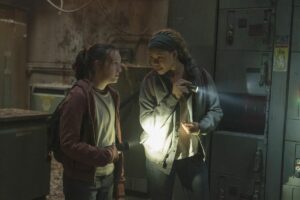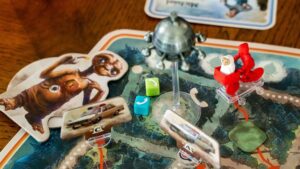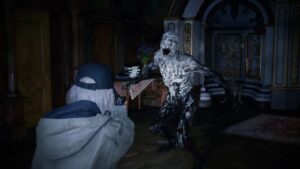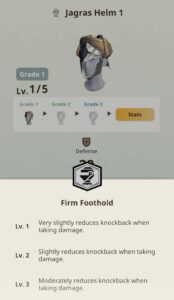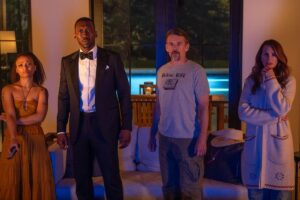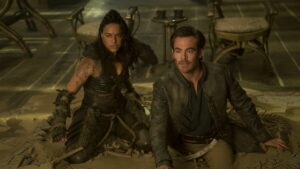[Ed. note: This article contains spoilers for Superman & Lois, Invincible, and The Boys.]
Superman often takes on a paternal role toward all of humanity. He’s so powerful that he can protect the residents of his adopted planet from almost any threat, yet he rarely directly intervenes in humanity’s overall development. He tries to set a good example for both regular people and other superheroes, and he embodies patience and understanding to the point where he tends to give his villains the chance to change their ways.
But several recent shows are making Superman’s paternalism much more literal by exploring the bonds between heroes and their superpowered sons. The CW’s Superman & Lois and Amazon Prime’s Invincible and The Boys use three very different versions of Superman, each with their own relationship with their sons, to explore the complexity of parental expectations and how kids are eventually forced to confront the limitations of the people they love.
Superman & Lois is more family drama than superhero show. Tyler Hoechlin plays a fairly traditional version of the big blue Boy Scout. He’s splashed with the hokiness of Modern Family’s Phil Dunphy, while facing the same challenges of balancing a high-pressure job and family obligations as Coach Eric Taylor in Friday Night Lights. This Superman has always had a complicated relationship with his now 14-year-old twin sons Jonathan (Jordan Elsass) and Jordan (Alex Garfin) because he isn’t around much — he’s constantly zipping away to stop some escaped criminal mastermind, or save people from a natural disaster. But after being laid off at the Daily Planet and discovering Jordan also has superpowers, Clark Kent is trying to make parenting a higher priority.
While Superman & Lois is a bit sappy, the CW series does a great job of exploring complicated parent-child issues around agency, privacy, and legacy. Jordan suffers from an anxiety disorder, and the fact that he may be developing godlike powers is a cause for serious concern. It’s easy to see how he could abuse Superman-like abilities, even with the best of intentions, like losing his temper with a bully at school, or drawing too much attention with his skill on the football field.
Superman and his sons walk a delicate line, with him trying to give them the space they need to develop while also keeping them safe as best he can. They fight over his tendency to eavesdrop on them with his super-hearing, but he also equips them with a special signal they can use to alert him in case of emergency. Superman originally opposes Jordan playing football, just as his own father wouldn’t let him play baseball, because his powers give him an unfair advantage. But Clark eventually relents, because he wants to be a better parent himself and doesn’t want to deprive Jordan of the pleasure of being part of a team.
The complicated relationship characters have with their fathers is woven throughout the show, with Lois Lane’s (Elizabeth Tulloch) father General Sam Lane (Dylan Walsh) arguing that Superman is too important to be wasting his time parenting, and encouraging Clark’s sons to leave him alone. Lois repudiates the idea as having more to do with Sam’s skewed priorities rather than Superman’s actual ability to have it all, but the warning helps push Jordan and Jonathan to try to resolve conflicts themselves.
As the first season has continued, that’s led to some nuanced issues involving Jordan facing an entirely new set of expectations. As one of the last Kryptonians, legacy is extremely important to Superman. As soon as he discovers Jordan has powers, he whisks him off to the Fortress of Solitude to meet the hologram of Jordan’s grandfather, Jor-El, and learn about how his powers work. Because Jordan is half-human, he might never be as powerful as his father, but the greater concern is really whether he’s going to be as noble and altruistic. The family moves from Metropolis to Smallville to try to recreate the nurturing environment where Clark explored his abilities and developed his powerful moral compass. Superman is determined to make sure Jordan uses his abilities responsibly, even taking an unpaid position as an assistant football coach so he can better monitor how his son is applying his super-strength on the field.

Superman & Lois is unique among these series in that Superman has two kids, and Jonathan doesn’t seem to have any powers. That’s a huge adjustment for a brother who had previously been seen as the golden child, and it creates an understandable resentment. He lashes out at Clark, arguing life was better when he was around less, and threatening to move back to Metropolis because he feels like his own needs are being ignored.
Superman tries his best to navigate the conflict by acknowledging Jonathan’s concerns, while also gently pushing the brothers to support each other. Overall, season 1 has portrayed him as a great dad who’s dealing with extraordinary situations. His kids are forced to acknowledge that he can’t solve all of their problems any more than he can solve all of humanity’s. By the end of each episode, they come to some sort of accord where everyone feels relatively safe and loved.
The Boys’ Superman stand-in Homelander (Anthony Starr) couldn’t pose a bigger contrast. While the general public might buy the propaganda that portrays him as righteous and kind, everyone who interacts with him directly quickly comes to understand that he’s a sociopath who must be appeased and controlled, or he’ll unleash his horrifying powers.
The Boys’ parental narrative is focused on abuse and the conflict between nature and nurture. Homelander was raised in a Vought International lab, and shown no love or kindness by his creator and de facto father, scientist John Vogelbaum (John Doman). John later comes to understand the scars that treatment left on Homelander’s psyche, and he tries to do better when he learns that Homelander impregnated a Vought employee, placing Becca Butcher (Shantel VanSanten) and her son Ryan (Cameron Crovetti) in a Truman Show-esque ideal suburb where Ryan can be nurtured and closely monitored.
Even though Homelander had a strong contempt for children before learning he had one of his own, he becomes fascinated with Ryan. But he’s only really interested in his powers. When Ryan appears to just be a gentle kid with no abilities, Homelander throws him off a roof. The logic seems to be, if he’s got Homelander’s power, he’ll survive and their relationship can develop the way Homelander wants. If he doesn’t, the kid isn’t worth his time.

Much of the show’s season 2 narrative is focused on the helplessness Becca experiences as she tries to protect Ryan from his brutal, horrific father. Yet Becca’s attempts to protect Ryan drive a wedge between them when he discovers that his childhood has been a carefully cultivated lie.
Homelander actually shows a rare moment of kindness to his son when Ryan ventures out into the wider world for the first time, and is overwhelmed by his supersenses. It’s an experience that perhaps only Homelander himself can understand, and he tries to help Ryan deal with it. Still, he’s a monster who doesn’t respect Ryan’s agency or wishes. Only the fear of having his nature exposed and losing the adulation he so desperately desires pushes him to abandon his claim on Ryan. While Ryan learns a horrific lesson about both the limits of his mom’s power and the depravity his father is capable of, season 2 ends with the hope that he’ll manage to embody Becca’s kindness and Homelander’s strength. Ryan is a particularly extreme example of the common parental wish that their kids will inherit their strengths while overcoming their weaknesses.
Amazon’s adaptation of Robert Kirkman and Cory Walker’s Invincible straddles the line between the ideal of Superman & Lois and the horrors of The Boys. Mark Grayson (Steven Yeun) idolizes his father Nolan (J.K. Simmons), and has wanted to be a hero since he learned as a young child that Nolan was Omni-Man, the most powerful superhero on the planet. When Mark finally manifests powers at 17, he’s eager to prove that he can live up to his father by mastering his abilities and fighting super-crime.
But Omni-Man isn’t the great hero and perfect husband and father he initially seems to be. The cracks show when he’s overly harsh while training Mark, and then lashes out at his wife Debbie (Sandra Oh) when she questions his methods. He blames Mark for the change by saying that he wasn’t prepared for his son to develop powers, and wishes it hadn’t happened at all. But by the end of the first episode of the series, he’s moved far beyond the actions of a father reacting poorly to a son’s newfound maturity. Instead, he’s showing he’s an absolute monster.
Like Superman, Omni-Man claims to have a paternal interest in protecting Earth, which he was supposedly assigned to as part of his planet’s effort to help “lesser developed worlds.” Yet immediately after learning Mark has powers, he kills Earth’s other greatest heroes. Omni-Man is gravely injured in the process, making Mark acutely aware that his father isn’t actually invincible, and upping the pressure Mark feels to help protect Earth himself. With the first season unfolding almost exactly as the comics did, it seems like much of the story will center on how Mark tries to live up to the ideals Omni-Man represents, without becoming the cruel man his father actually is. It’s a strong metaphor for the ways any teen whose relationship with their parents is complicated might try to embody the qualities they love while fearing that the worst of their parents also lurks within.

The power imbalance between Superman and normal humans is akin to that between a parent and child. Superman is a hugely aspirational character, an embodiment of how power can be used justly and selflessly to protect those without it. Ideally, parents use their strength and knowledge to nurture and protect their kids, while trying to bring out the best in them. But too many parents abuse that power to emotionally or physically harm their children. Likewise, dark portrayals of Superman are so popular because it’s so easy to imagine how his incredible power could be used for evil, and just how terrifying it would be to live at the mercy of a tyrant.
Most parents aren’t as horrific as Homelander, who deserves no part in his son’s life. Even though adolescents might realize the flaws in their parents as they come into their own power and individuality, the gap between childhood perception and mature reality is rarely as glaring as it is with Omni-Man. It’s the original Superman that provides the best model of a healthy father-son relationship in Superman & Lois. He’ll never be a perfect parent, but he and Jordan can learn from and draw strength from each other, and grow into better people together.
Source: https://www.polygon.com/tv/22364450/superdads-the-boys-invincible-superman-and-lois- Absolute
- ADvantage
- alex
- Amazon
- among
- amp
- Anxiety
- around
- article
- Assistant
- Baseball
- BEST
- Bit
- Bonds
- buy
- Cause
- change
- child
- Children
- City
- claims
- Common
- Compass
- conflict
- creator
- Criminal
- deal
- dealing
- develop
- Development
- DID
- disaster
- disorder
- Drama
- ends
- Environment
- Experiences
- facing
- family
- Finally
- First
- first time
- flaws
- Football
- Fortress
- gap
- General
- good
- great
- Grow
- How
- HTTPS
- huge
- Humans
- idea
- interest
- International
- issues
- IT
- Job
- keeping
- kids
- Kills
- knowledge
- LEARN
- learned
- learning
- Led
- Line
- love
- Making
- man
- mark
- model
- mother
- move
- moves
- Other
- Parenting
- parents
- People
- planet
- Popular
- power
- pressure
- privacy
- Propaganda
- protect
- public
- Reality
- ROBERT
- safe
- School
- Series
- set
- So
- SOLVE
- son
- Space
- superhero
- superheroes
- support
- time
- Training
- treatment
- Ventures
- WHO
- within
- Work
- world
- worth



